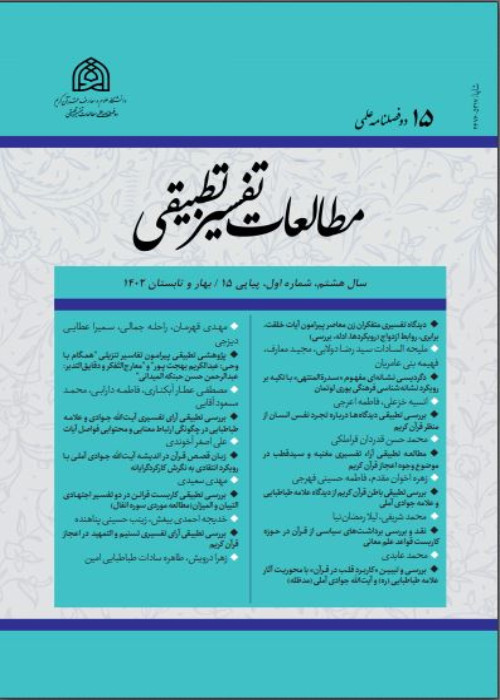A comparative study of commentators' views on the verses referring to asking for forgiveness from the Holy Prophet (PBUH) (in verses 19 of Surah Muhammad and 104 of Surah Nisa)
Author(s):
Article Type:
Research/Original Article (دارای رتبه معتبر)
Abstract:
In the guidance of Ahl al-Bayt (AS) and the teachings of the Qur'an, the prophets (AS) are innocent of committing sin. But some verses seem to contradict this belief.The 19th verses of Muhammad (PBUH) and the 104 suras of Nisaa are among those verses in which the Prophet (peace be upon him) was commanded to be rejected. The commentators have different opinions about the reason for the Prophet's asking for forgiveness in these two verses and have tried to provide an interpretation of these verses that does not contradict the Prophet's infallibility; But none of their opinions are without problems. The present article, with the aim of removing doubts about the infallibility of the Holy Prophet (PBUH), after examining and criticizing the existing opinions, based on numerous evidences from verses and narrations, has come to the conclusion that: Asking for forgiveness in Surah Muhammad (PBUH) for Praying is to remove unpleasant things that are not worthy of believers, so that the effects of unpleasant things are removed and the basis for benefiting from divine blessings, which are the result of pure faith, is provided. The reason for seeking forgiveness in Surah Nisa is also related to the judgment that the Holy Prophet (PBUH) made. In this judgment, according to the Islamic law, he was assigned to judge based on the evidence of the parties to the dispute, and he judged correctly in this dispute. But because his judgment was influenced by the false testimony of some who gave false testimony, an innocent person was exposed to slander. Therefore, to ward off the bad effects of this judgment based on appearance, the Prophet (PBUH) was ordered to ask for forgiveness. The approach of this research is based on the Qur'an, on this basis, religious matters (intellect, Qur'an, tradition, experience, literature, the way of rational and legal scholars, etc.) are the judges of religious thoughts and practices based on the Holy Qur'an.
Keywords:
Language:
Persian
Published:
Journal of Comparative Interpretation Studies, Volume:7 Issue: 14, 2023
Pages:
64 to 85
magiran.com/p2564685
دانلود و مطالعه متن این مقاله با یکی از روشهای زیر امکان پذیر است:
اشتراک شخصی
با عضویت و پرداخت آنلاین حق اشتراک یکساله به مبلغ 1,390,000ريال میتوانید 70 عنوان مطلب دانلود کنید!
اشتراک سازمانی
به کتابخانه دانشگاه یا محل کار خود پیشنهاد کنید تا اشتراک سازمانی این پایگاه را برای دسترسی نامحدود همه کاربران به متن مطالب تهیه نمایند!
توجه!
- حق عضویت دریافتی صرف حمایت از نشریات عضو و نگهداری، تکمیل و توسعه مگیران میشود.
- پرداخت حق اشتراک و دانلود مقالات اجازه بازنشر آن در سایر رسانههای چاپی و دیجیتال را به کاربر نمیدهد.
In order to view content subscription is required
Personal subscription
Subscribe magiran.com for 70 € euros via PayPal and download 70 articles during a year.
Organization subscription
Please contact us to subscribe your university or library for unlimited access!


